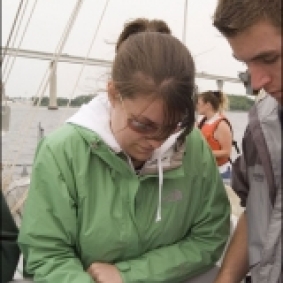Eight students will be presenting the summer work at the Ocean Sciences Meeting in March 2022!
Kimberly Pierce, Clarkson University
Class Year:
2006Mentor:
Tom Fisher, Ph.D.Project Title:
Effect of Denitrification on Methanogenesis in Groundwater of Agricultural Areas in the Choptank River Watershed
Abstract:
Methane is important to study because of its role as a greenhouse gas. In our attempts to solve environmental problems, it is important to fully understand the system we are dealing with so as to not inadvertently create a new problem, or add to a preexisting one. This study was focused on the relationship between denitrification and methanogenesis in areas dominated by agriculture. According to past lab studies, there should be a negative correlation between methanogenesis and denitrification in soils rich in nitrate. Three different farms were studied using a subset of 8 groundwater wells. Samples were taken and analyzed for dissolved methane, nitrogen gas, and oxygen. These variables were regressed to test the relationship predicted by the literature. Overall, there was found to be no significant correlation between methanogenesis and denitrification; however, there was a significant negative correlation found at one of the three farms when examined separately (r2 = 0.58, p = 0.02). A highly significant inverse quadratic relationship was also found between the concentration of methane and the percent saturation of oxygen in the samples (r2 = 0.33, p < 0.01). These results show that microsites in soils can produce methane despite high levels of nitrate and denitrification in the bulk soil properties.
Location:
Horn Point LaboratoryPresentations:
Pierce, K.*, and T. Fisher. 2007. Methanogenesis and denitrification in groundwaters of agricultural areas on the Delmarva Peninsula . ASLO Aquatic Sciences Meeting, Santa Fe, New Mexico .




